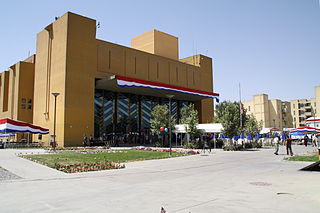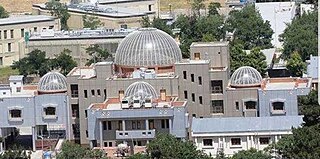Related Research Articles

The Taliban insurgency began after the group's fall from power during the 2001 War in Afghanistan. The Taliban forces fought against the Afghan government, led by President Hamid Karzai, and later by President Ashraf Ghani, and against a US-led coalition of forces that has included all members of NATO; the 2021 Taliban offensive resulted in the collapse of the government of Ashraf Ghani. The private sector in Pakistan extends financial aid to the Taliban, contributing to their financial sustenance.

The 2008 Indian embassy bombing in Kabul was a suicide bomb terror attack on the Indian embassy in Kabul, Afghanistan on 7 July 2008 at 8:30 AM local time. The bombing killed 58 people and wounded 141. The suicide car bombing took place near the gates of the embassy during morning hours when officials enter the embassy.
The 2009 Kabul Indian embassy bombing was a suicide bomb attack on the Indian embassy in Kabul, Afghanistan on 8 October 2009 at 8:30 am local time. The bombing killed 17 people and wounded 83.
The February 2010 Kabul attack on 26 February 2010 was a combined suicide bombing and shooting attack. A car bomb levelled the Arya Guesthouse, also known as the Hamid Guesthouse, popular with Indian doctors. Two armed attackers then entered the nearby Park Residence, housing other foreigners. One detonated a suicide bomb, and the other was shot dead. The Safi Landmark Hotel nearby was badly damaged by the blasts. At least 18 people were killed and 36 more were injured.
Events from the year 2011 in Afghanistan.

The April 2012 Afghanistan attacks took place on Sunday, 15 April 2012, at around 13:00 local time when heavily armed Taliban insurgents and suicide bombers launched multiple coordinated attacks throughout Afghanistan. Insurgents launched the 2012 spring offensive on multiple locations, including government buildings, military bases, and embassies. Attacks occurred in four Afghan provinces, including Kabul and Paktia. Different reports attribute responsibility for the attacks to either Taliban or the Haqqani network although the Taliban have claimed responsibility.
The following lists events from 2014 in Afghanistan.
The following lists events that happened in 2013 in Afghanistan.
The following lists events that happened during 2015 in Afghanistan.
The following lists events that happened during 2016 in Afghanistan.
The September 2011 Kabul attack occurred when Taliban fighters attacked multiple locations in Kabul, Afghanistan including the US Embassy and NATO headquarters, on 13 September 2011. The insurgents and at least seven others were killed and 15 were wounded. It was the first incident in the capital in which widely separated targets came under simultaneous attack. Elements within the Afghan and Pakistan governments were suspected of complicity in the attacks.
On the morning of 19 April 2016, Taliban militants attacked a security team responsible for protecting government VIPs in Kabul, Afghanistan. The initial attack killed 64 people and wounded 347. It was their biggest attack on an urban area since 2001.
Events in the year 2017 in Afghanistan.
On 31 May 2017, a truck bomb exploded in a crowded intersection in Kabul, Afghanistan, near the German embassy at about 08:25 local time during rush hour, killing over 150 and injuring 413, mostly civilians, and damaging several buildings in the embassy. The attack was the deadliest terror attack to take place in Kabul. The diplomatic quarter—in which the attack took place—is one of the most heavily fortified areas in the city, with three-meter-high (10 ft) blast walls, and access requires passing through several checkpoints. The explosion created a crater about 4.5 meters (15 ft) wide and 30 feet deep. Afghanistan's intelligence agency NDS claimed that the blast was planned by the Haqqani Network. Although no group has claimed responsibility, the Afghan Taliban are also a suspect but they have denied involvement and condemned the attack. It was the single largest attack on the city up till that point.
Events from the year 2019 in Afghanistan.

The Embassy of India in Kabul is the diplomatic mission of the Republic of India to Afghanistan. The current Ambassador is Rudrendra Tandon.

Large-scale evacuations of foreign citizens and some vulnerable Afghan citizens took place amid the withdrawal of US and NATO forces at the end of the 2001–2021 war in Afghanistan. The Taliban took control of Kabul and declared victory on 15 August 2021, and the NATO-backed Islamic Republic of Afghanistan collapsed. With the Taliban controlling the whole city except Hamid Karzai International Airport, hostilities ceased and the Taliban assisted in the evacuation effort by providing security and screening evacuees.

The Embassy of Turkey in Kabul is the diplomatic mission of the Republic of Turkey to resident in Kabul. Formally, the embassy and its staff are still accredited to the Islamic Republic of Afghanistan. The ambassador meets with the unrecognized Islamic Emirate of Afghanistan officials and Taliban members as practically they are the current government of Afghanistan. In March 2022, Foreign Minister Mevlüt Çavuşoğlu has expressed the intention to internationally recognise the Islamic Emirate. The current situation regarding Turkey recognising the Islamic Emirate is ambiguous.
References
- ↑ "Kabul bomb hits Turkish embassy car". Public Radio of Armenia. Retrieved 14 May 2023.
- ↑ "NATO Senior Civilian Representative in Afghanistan (designate)". NATO. 2015.
- ↑ "Kabul Bomb Hits Turkish Embassy Car". RadioFreeEurope/RadioLiberty. Retrieved 14 May 2023.
- ↑ "Kabul bomb hits Turkish embassy car". BBC News. 26 February 2015. Retrieved 14 May 2023.
- 1 2 "Turkish soldier killed in attack on embassy vehicle in Kabul". AP NEWS. Retrieved 14 May 2023.
- ↑ "T.C. Dışişleri Bakanlığı – Turkish Embassy In Kabul – Büyükelçilik Tarihi ve Önceki Büyükelçilerimiz". kabil.be.mfa.gov.tr. Retrieved 14 May 2023.
- ↑ "Afganistan ve Polonya Büyükelçilik Binaları". Sanattan Yansimalar (in Turkish). Retrieved 14 May 2023.
- ↑ ANKARA, Uğur ERGAN /. "Cesur Müfit Kabil Elçisi". www.hurriyet.com.tr (in Turkish). Retrieved 14 May 2023.
- ↑ Bildirici, Faruk. "Amerikan elçisinin adamlarına tüfek çevirttim yarım saat kımıldamadan beklettim". www.hurriyet.com.tr (in Turkish). Retrieved 14 May 2023.
- ↑ "Afganistan'da Türk mühendis öldürüldü". arsiv.ntv.com.tr. Retrieved 14 May 2023.
- ↑ A.A. "Tokdemir Kabil büyükelçiliğine atandı". www.hurriyet.com.tr (in Turkish). Retrieved 14 May 2023.
- ↑ Wilson, Grady (22 December 2022). "H.E. Basat Öztürk". Atlantic Council. Retrieved 14 May 2023.
- ↑ Kelley, Michael B. "There's A Reason Why All Of The Reports About Benghazi Are So Confusing". Business Insider. Retrieved 14 May 2023.
- ↑ MENAFN. "Afghanistan, Turkey Celebrates 100 Years Of Diplomatic Relations". menafn.com. Retrieved 14 May 2023.
- ↑ "Taliban aid group donates $50,000 in plastic bag to Turkey earthquake victims". Al Arabiya English. 15 February 2023. Retrieved 14 May 2023.